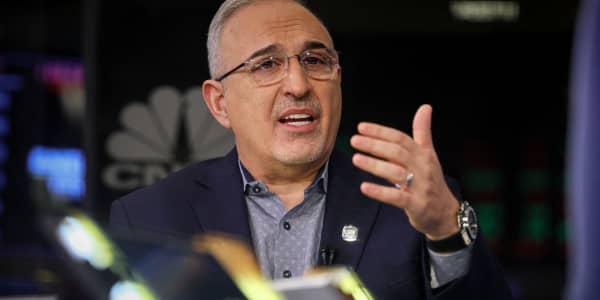It wasn't that long ago that company leaders had the luxury of sidestepping social or political issues that were outside their areas of expertise or even comfort.
Those days are gone according to Megan Reitz, professor of leadership and dialogue at the Hult International Business School, who recently spoke at CNBC's Workforce Executive Council Town Hall about how companies, and specifically human resources leaders, can better navigate the intense employee activism and political divide taking place now.
There was a time, Reitz said, when it was a reasonable decision for companies "to sit on the activism fence and say they were apolitical. That position is increasingly untenable." An ever-growing list of tough issues — responses to the Covid-19 pandemic, anti-abortion legislation, LGBTQ rights and gun violence, among them — are forcing companies to decide where they stand and what they're going to say to stakeholders.
That's not to suggest, Reitz said, that companies have to act on every issue that develops. But it does mean that "leaders need to recognize that inaction can be viewed as political as action," she added.
Workers want leaders to speak out
A recent CNBC|Momentive Workplace Happiness survey found that 32% of workers say they support their companies' speaking out on social issues regardless of whether they agree with them. Twenty-one percent support their companies speaking out but only if they agree with the position.
That kind of response requires companies to understand what matters to stakeholders both inside and outside of the organization, Reitz said. In her work with company leaders, she often challenges them to question how they know what they know. "Often companies believe they know how employees feel about a certain topic or issue, but it's important to question how they know this," she said.
With employee activism likely to increase in the months and years ahead, Reitz stressed how crucial it is for leaders to create space for dialogue. She cautioned companies to avoid what she calls "façade-ism," where companies say the right thing on activist issues but then fail to follow up with any concrete action. Reitz also believes leaders need to dispel the fantasy that conversations around social and political issues will be harmonious and neat.
"There will be fallout and there will be disagreements," said. "Don't be afraid of that." Some of the executive teams Reitz works with will even "role model" disagreements, with managers taking opposing views on a topic and then demonstrating in front of employees how to have a respectful conversation.
Two kinds of employee engagement
In studying the intersection between leadership and activism, Reitz says there are basically two forms of engagement — defensive and dialogic. The former she describes as "do what the lawyers tell you to do." Companies that operate this way will distill diversity, equity and inclusion efforts to "counting the number of women in particular roles" rather than taking a more expansive view of what they're trying to change.
Dialogic engagement requires leaders to acknowledge that they don't know the answer and they have to find out their blind spots. "The common model of a leader is someone who must be certain of the answer, show certainty, and direct others," Reitz said. With dialogic engagement, a leader is willing to admit that their perspective is partial or that they've never experienced the issue they're dealing with, and will seek out other viewpoints.
"This is not a pretty place necessarily, but it leads to a much better understanding of an issue and leaders need to learn through it," she said.
There's also a third approach, embodied by companies such as Ben & Jerry's and Patagonia that have long sought to stimulate activism and dialogue, Reitz said. More recently, she has been contacted by organizations that are looking to recruit activist employees to bring a certain energy and passion to critical issues such as climate change.
One company that's been vocal about this, she said, is Boston Consulting Group. Earlier this year, BCG's new CEO, Christoph Schweizer, said the consultancy is looking to hire climate activists who can have an impact on the battle to slow global warming by advising some of the world's biggest companies taking on this issue.
"Climate change requires technical knowledge, but it also requires people with energy and passion and an understanding of how change happens," Reitz said.
One of the risks of recruiting activist employees, of course, is giving them the greenlight to make the changes they advocate for. "We're really good in organizations at assimilating people and squeezing the differences out of them," Reitz said. "It seems like a good idea but when they're messing around with power, then agendas and politics come out."
Companies that want to recruit activist employees have to think through how they're going to support those differences and the changes that come with it. "It could work, but it can also go horribly wrong," she said.
To join the CNBC Workforce Executive Council, apply at cnbccouncils.com/wec.






